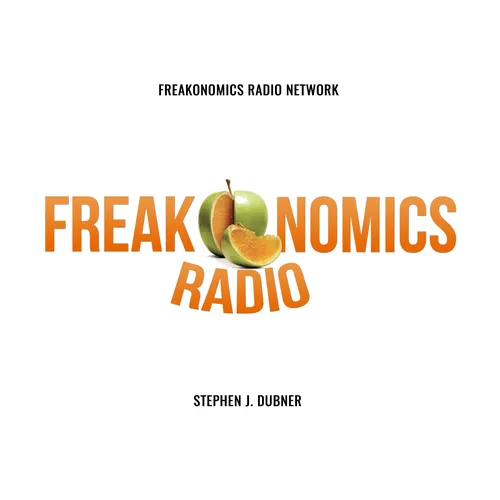
Freakonomics Radio
Freakonomics co-author Stephen J. Dubner uncovers the hidden side of everything. Why is it safer to fly in an airplane than drive a car? How do we decide whom to marry? Why is the media so full of bad news? Also: things you never knew you wanted to know about wolves, bananas, pollution, search engines, and the quirks of human behavior.
To get every show in the Freakonomics Radio Network without ads and a monthly bonus episode of Freakonomics Radio, start a free trial for SiriusXM Podcasts+ on Apple Podcasts or by visiting siriusxm.com/podcastsplus.
- Update frequency
- every 5 days
- Average duration
- 41 minutes
- Episodes
- 857
- Years Active
- 2010 - 2025

The Economics of Sleep, Part 2 (Rebroadcast)
People who sleep better earn more money. Now all we have to do is teach everyone to sleep better.

The Economics of Sleep, Part 1 (Rebroadcast)
Could a lack of sleep help explain why some people get much sicker than others?

240. Yes, the American Economy Is in a Funk -- But Not for the Reasons You Think
As sexy as the digital revolution may be, it can't compare to the Second Industrial Revolution (electricity! the gas engine! antibiotics!), which created the biggest standard-of-living boost in U.S. …

239. The No-Tipping Point
The restaurant business model is warped: kitchen wages are too low to hire cooks, while diners are put in charge of paying the waitstaff. So what happens if you eliminate tipping, raise menu prices, …

238. The United States of Cory Booker
The junior U.S. Senator from New Jersey thinks bipartisanship is right around the corner. Is he just an idealistic newbie or does he see a way forward that everyone else has missed?

237. Ask Not What Your Podcast Can Do for You
Now and again, Freakonomics Radio puts hat in hand and asks listeners to donate to the public-radio station that produces the show. Why on earth should anyone pay good money for something that can be…

236. How Can This Possibly Be True?
A famous economics essay features a pencil (yes, a pencil) arguing that “not a single person on the face of this earth knows how to make me.” Is the pencil just bragging? In any case, what can the pe…

235. Who Needs Handwriting?
The digital age is making pen and paper seem obsolete. But what are we giving up if we give up on handwriting?

How to Fix a Broken High Schooler, in Four Easy Steps (Rebroadcast)
Okay, maybe the steps aren't so easy. But a program run out of a Toronto housing project has had great success in turning around kids who were headed for trouble.

Is America’s Education Problem Really Just a Teacher Problem? (Rebroadcast)
If U.S. schoolteachers are indeed "just a little bit below average," it's not really their fault. So what should be done about it?

234. Do Boycotts Work?
The Montgomery Bus Boycott, the South African divestment campaign, Chick-fil-A! Almost anyone can launch a boycott, and the media loves to cover them. But do boycotts actually produce the change they…

233. How to Be Less Terrible at Predicting the Future
Experts and pundits are notoriously bad at forecasting, in part because they aren't punished for bad predictions. Also, they tend to be deeply unscientific. The psychologist Philip Tetlock is finally…

232. The True Story of the Gender Pay Gap
Discrimination can't explain why women earn so much less than men. If only it were that easy.

When Willpower Isn’t Enough (Rebroadcast)
Sure, we all want to make good personal decisions, but it doesn't always work out. That's where "temptation bundling" comes in.

Fixing the World, Bang-for-the-Buck Edition (Rebroadcast)
A team of economists has been running the numbers on the U.N.'s development goals. They have a different view of how those billions of dollars should be spent.

231. Is Migration a Basic Human Right?
The argument for open borders is compelling -- and deeply problematic.

230. The Cheeseburger Diet
One woman's quest to find the best burger in town can teach all of us to eat smarter.

229. Ben Bernanke Gives Himself a Grade
He was handed the keys to the global economy just as it started heading off a cliff. Fortunately, he'd seen this movie before.

Why Do People Keep Having Children? (Rebroadcast)
Even a brutal natural disaster doesn't diminish our appetite for procreating. This surely means we're heading toward massive overpopulation, right? Probably not.

228. Does “Early Education” Come Way Too Late?
In our collective zeal to reform schools and close the achievement gap, we may have lost sight of where most learning really happens -- at home.